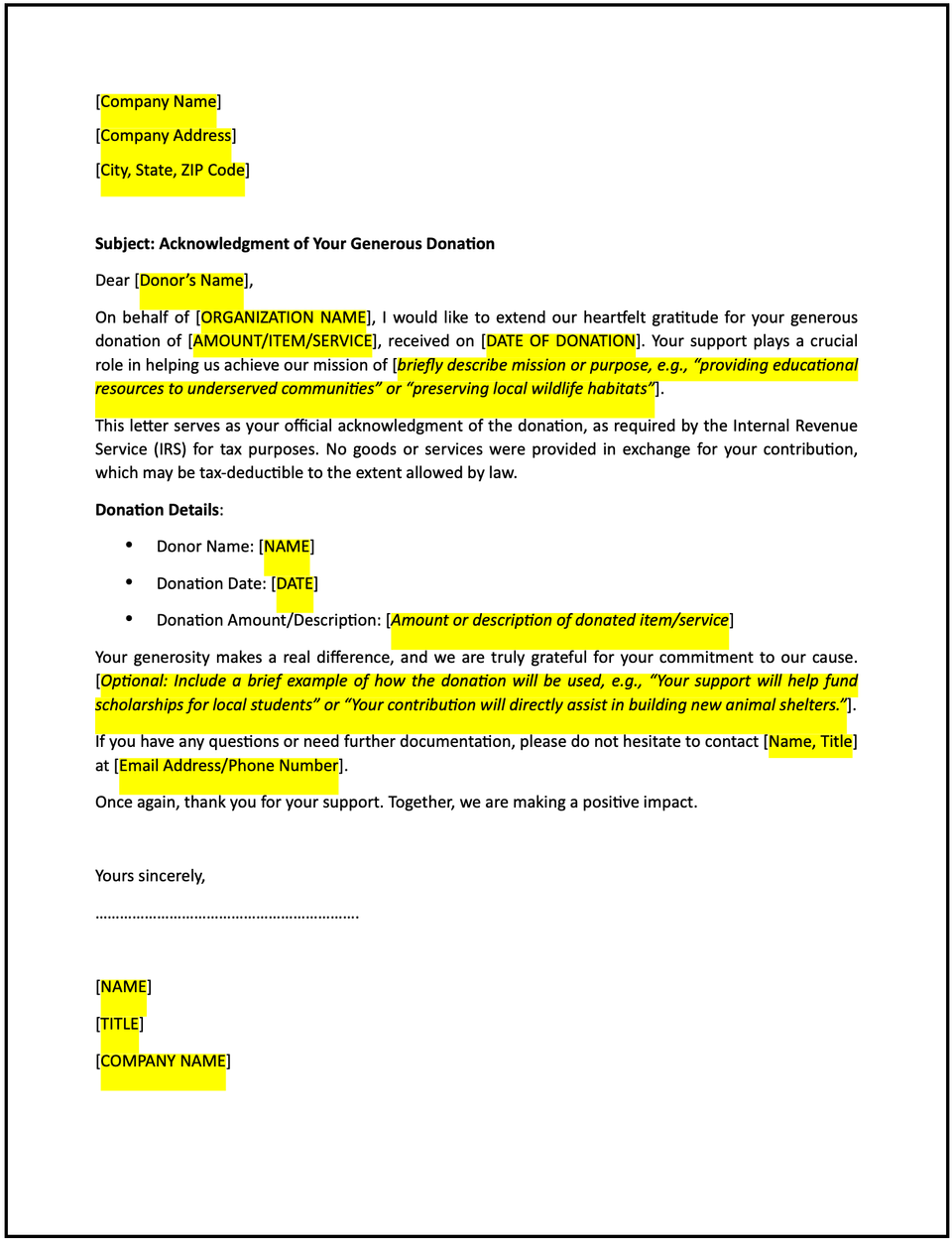Acknowledgment of donation letter: Free template

Acknowledgment of donation letter
An acknowledgment of donation letter is a formal communication used to thank donors for their contributions, recognize their generosity, and provide confirmation for tax or personal records. This letter emphasizes gratitude, highlights the impact of the donation, and strengthens the relationship with the donor.
How to use this acknowledgment of donation letter
- Open with an introduction: Address the donor respectfully and express heartfelt gratitude for their contribution.
- Confirm the donation: Specify the donation amount, the date it was received, and any relevant details, such as its intended purpose or fund allocation.
- Highlight the impact: Explain how the donation will be used to support your mission, project, or cause, providing specific examples if possible.
- Reassure the donor: Emphasize how their generosity makes a tangible difference and aligns with your organization’s goals.
- Include a personal touch: Share a brief anecdote, quote, or message that connects the donor to the positive outcomes of their contribution.
- Provide a receipt: If applicable, include details needed for tax purposes, such as your organization’s tax ID and the value of the donation.
- Maintain a professional tone: Ensure the letter is clear, respectful, and focused on expressing appreciation.
- Provide contact information: Include details for the donor to reach out with questions or for future contributions.
Benefits of using an acknowledgment of donation letter
This letter ensures a structured and professional way to thank donors while fostering trust and continued support. Here’s how it helps:
- Builds relationships: Expressing gratitude strengthens the connection between donors and your organization.
- Reflects professionalism: A well-crafted letter demonstrates respect and appreciation for the donor’s generosity.
- Encourages future contributions: Highlighting the impact of the donation fosters a sense of fulfillment and ongoing support.
- Supports transparency: Providing details about the donation’s use reassures donors of their contribution’s value.
- Reinforces trust: Acknowledging donations promptly demonstrates reliability and attentiveness.
Tips for writing an effective acknowledgment of donation letter
- Be specific: Clearly outline the donation details, including the amount, purpose, and date received.
- Use professional yet warm language: Maintain a tone of gratitude and appreciation to make the donor feel valued.
- Provide context: Briefly explain how the donation contributes to your mission or project goals.
- Highlight the impact: Share specific examples of how the donation is making a difference.
- Include actionable steps: Encourage donors to stay connected or learn more about your organization’s work.
- Keep it concise: Focus on the key points while ensuring the tone is heartfelt and engaging.
Frequently asked questions (FAQs)
Q: What details should I include in this letter?
A: Include the donation amount, date, purpose, tax details (if applicable), and a message of gratitude.
Q: Should I personalize the letter?
A: Yes, addressing the donor by name and referencing their specific contribution adds a personal touch.
Q: Who typically sends this letter?
A: Development officers, fundraising teams, or organizational leadership typically send this letter.
Q: How formal should this letter be?
A: The tone should be professional yet warm, focusing on gratitude and relationship-building.
Q: When should this letter be sent?
A: Send the letter promptly after receiving the donation to demonstrate attentiveness and appreciation.
Q: Can this letter include a breakdown of the donation’s impact?
A: Yes, providing specific examples or metrics enhances transparency and reinforces the donor’s value.
Q: Is acknowledgment from the donor required?
A: While not mandatory, inviting donors to share feedback or remain engaged fosters ongoing collaboration.
This article contains general legal information and does not contain legal advice. Cobrief is not a law firm or a substitute for an attorney or law firm. The law is complex and changes often. For legal advice, please ask a lawyer.


